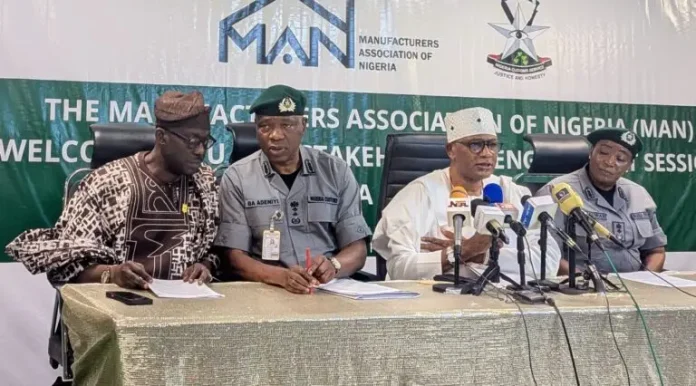News Investigators/ The Nigeria Customs Service (NCS) and the Manufacturers Association of Nigeria (MAN) on Friday agreed on strategic exemptions from the recently suspended four per cent Free on Board (FoB) charge.
They also outlined fresh trade facilitation measures to ease manufacturing operations and strengthen Nigeria’s industrial growth.
The News Agency of Nigeria (NAN) reports that the decision was reached at a joint consultative meeting between both organisations in Lagos.
It was convened in line with the Nigeria Customs Service Act 2023 and following the directive of the Minister of Finance on the temporary suspension of the four per cent FOB levy.
The Comptroller-General of Customs, Bashir Adeniyi, said the engagement provided an opportunity to balance the Service’s revenue mandate with its trade facilitation objectives.
He said the exemptions reflected government’s commitment to protecting critical sectors, especially manufacturing, while maintaining an efficient revenue collection system.
Mr Adeniyi said that following consultations with the Minister of Finance and the Coordinating Minister of the Economy, approval had been granted for strategic exemptions from the four per cent FoB charges on the following, among others:
They include importation of raw materials, spares, and machines by manufacturers who are beneficiaries of concessions contained in chapters 98 and 99 of the Customs Tariff.
According to him, manufacturers who are currently on chapters 98 and 99 are advised to apply for pre-release of the consignment to avoid payment of demurrage.
The customs boss said MAN, NCS, and the Federal Ministry of Finance would work together for the inclusion of manufacturers that were currently not on chapters 98 and 99.
He added that an immediate tripartite consultation by Ministry of Finance, NCS, and MAN would be held immediately to work out the modalities for expedited onboarding of manufacturers on chapters 98 and 99.
“In the meantime, the 4 per cent FoB payments already made by manufacturers who are yet to be on-boarded to chapters 98 and 99 will be held as credit and be utilised for future customs-related transactions after their onboarding.
“Moving forward, the Nigeria Customs Service commits to maintaining ongoing consultation with manufacturing sector stakeholders.
“We also commit to continuing development of trade facilitation infrastructure supporting industrial growth, implementing technology solutions that reduce compliance costs, and providing regular briefings on policy developments,” he said.
Mr Adeniyi added that other exemptions were granted for government projects with import duty exemptions certificates, goods imported for humanitarian, life saving and other related purposes, commercial airlines spare parts and beneficiaries of the Presidential initiative for unlocking healthcare value chain.
The President of MAN, Francis Meshioye, described the outcome as a milestone that would help reduce production costs and improve industrial competitiveness.
He provided valuable insights into operational challenges faced by the manufacturing sector and identified specific areas where enhanced collaboration could improve industrial competitiveness.
Mr Meshioye said areas of challenge beguiling the sector included the implementation of the four per cent FoB as funding for NCS operations, multiple checkpoints, multiple alerts in the clearance system and B’Odogwu platform glitches.
He, however, commended the Authorised Economic Operator (AEO) scheme and agreed that a clear guideline for admission would be issued by the Nigeria Customs Service.
“The gesture of these exemptions presents concrete evidence of the service’s commitment to supporting critical sectors of the economy as it continues to maintain appropriate revenue collection frameworks.
“MAN commits to constructive engagement in policy dialogue processes, providing sector-specific expertise to inform customs policy development, supporting member compliance with regulations, and collaborating in developing industry best practices,” he said.
NAN also reports that both organisations agreed to deepen cooperation in technology-driven trade facilitation, development of one-stop shop frameworks to cut bureaucracy, and periodic reviews of customs policies to reflect manufacturing needs.
NAN


